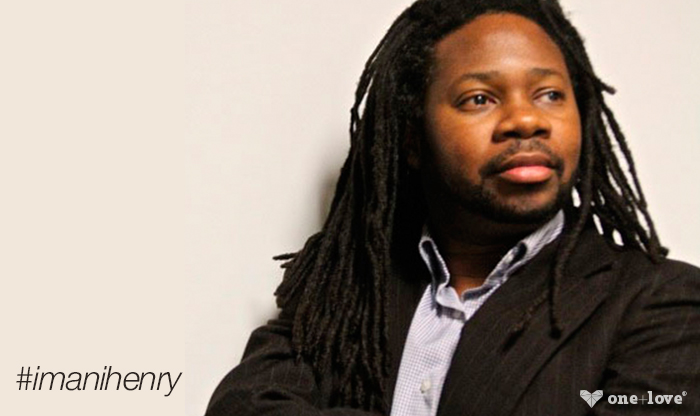
Imani Henry, Change Agent
Imani Keith Henry, MSW, MPA, is a diversity trainer and organizational development consultant. He is the principal of OD for the People. Philosophically rooted in the client-centered modality of harm reduction psychotherapy, Imani has worked as a social service worker and administrator in New York City and Boston since 1992. Much of his background and expertise has been in HIV prevention/education, primarily with adolescents and adults dually-diagnosed with mental health conditions and substance use.
What led you to pursue social work?
It depends what you mean by social work. I have always been involved in community organizing projects since graduating from high school. This was because as a Caribbean person, as a working-class person, as a LGBTQ person — my communities were and continue to be economically disenfranchised and exploited, and thus forced to create our own resources and services.
I started doing camp counseling and working in after-school programs as a young person. When I was 20 years old, I was trained in court mediation as part of an anti-racist community project. Then later began doing HIV and harm reduction-related case management and administration, community organizing, and now diversity training and consulting. All of those things were to take care of myself, loved ones, and communities — to make sure we all had what we needed and deserved.
In 2013 I finished a dual Masters program for social work and nonprofit administration.
What transformations, disruptions, interventions would you like to see within the field of social work?
What innovations I’d love to see is for more of us to truly see ourselves as workers. I believe that we need more union organizing among ourselves and — especially for those of us with masters degrees — to begin to understand that it is in the best interest of our clients for us as workers to have a living wage with health benefits, etc. High morale means better productivity and less burnout for us as social service professionals.
I have been in a union as a social worker with other workers that did direct service work. In our struggle, people hadn’t been paid wage increases or cost-of-living increases in seven years — for an agency that only worked with low-income people. When our clients saw our union stickers and posters around the office and saw that we were fighting with the administration of the organization, or learned that we hadn’t had a raise in seven years, they were appalled. Some clients would say, “Wow, you’re the people helping us and you’re not getting enough money!?.” Or say, “You haven’t had a raise and seven years? How can you live?”
So I think it’s important that if social work is about social justice then we need to model the fight for economic justice in our workplaces. The same way that we encourage folks to eat healthy, and so we put healthier things in the vending machines or we serve healthy meals in a cafeteria to our clients. Or if we work for an organization that fights for reproductive justice, then maybe we have childcare and parenting classes and create a sex-positive, non-shaming environment, and we lobby or go to protests for better reproductive health policies — then we also need to have our agencies and organizations become more WORKER-affirming and just!
Fighting for an union, fighting for a living wage or better working conditions is about setting an example that economic justice is important to all of us — NOT just for our clients. Social service workers are also working two or three jobs, just as our clients and everyone else in this economy. In fact, the union I was in did a survey and it was one of the statistical truths for my union that every social worker — specifically folks with a masters in social work — had two jobs, lived with roommates, or needed another income to help in their basic survival because they could not afford to live on what agency paid them. And for the most part we were the highest paid workers within our unit, so can you imagine what the non-social workers in our union were making?
It’s just not fair and if we’re modeling transformative healing, behavior, and justice as agencies,
then we also as employees, as workers, need to stand for transformative change in our work lives. That way our clients see that we too believe that the fight for a better future, better circumstances, and better living conditions is possible and necessary.
What excites you as an active-ist? (You seem really busy!) What challenges you?
Politically, I really enjoy mass demonstrations! I think there is nothing like being surrounded by 100s, 1000s, or millions of people fighting for social change. I think demonstrations are the best things in the world! They help break my sense of day-to-day isolation in the social justice work that I do and reminds me that I am not alone — look at all these people!
I can’t wait for May Day 2014 — May 1st — which is seen as an international workers’ rights day and holiday. Outside the US, workers do not work on May 1st. Here, since 2006, led by the immigrant /migrant workers’ movement, May Day has been a day for people to walk off the job or to protest against the US government’s attacks on immigrants. May Day is going to be big this year! I think about all the activism happening to stop deportations and to get justice for migrant workers. When I think about low-wage workers fighting to unionize and for basic rights planning all kinds of actions for May Day across the country, I get really excited about May 1st and I’m looking forward to that!
What is challenging for me is that when we talk about the low-wage workers’ struggle, we are NOT just talking about workers in the fast food industry like Wendy’s and McDonald’s. We are really talking about workers who are not making living wage — who make under $15/hour — and that includes lots of people! People working in social services that are HIV testers and counselors, outreach workers, housing specialists, case managers, and even social workers who, many times, work another full-time or part-time job to pay back their student loans or to pay for their own health insurance. This is true for people working in offices, retail stores, etc — all of these workers are low-wage workers.
I work with a group called The Peoples Power Assemblies and we believe that living in a city like New York and making under $20/hour is almost impossible for people to live on. So we are fighting for at least $15/hour as a living wage for every worker.
Another part of my activism as a social service worker is around the rights of people in my own industry to make a living wage and to work in conditions that are not oppressive or exploitative. Social service workers generally work long hours for little pay. Some of us don’t have health benefits and definitely don’t get dental or vision care. Lot of times we don’t get time off, or sick or vacation time. There’s an expectation that with a tiny staff of people you’re supposed to do a lot of work, like having 100 people on your caseload because of budget cuts.
I work with a group called the Radical Social Worker Group and our labor/workers’ rights working group is called PRESS (Power for Rank and File Employees in the Social Services).
I like campaigns that unite many people and issues…fighting for economic justice…demanding that every worker has a right to living wage and health benefits…allows you talk about migrant workers’ rights, the school to prison pipeline, and why young people of color need jobs not jails and not to be stopped and frisked, or that LGBTQ people of color are one of the most economically disenfranchised groups and how racism, classism, and LGBTQ oppression are linked to the fight for affordable housing and jobs. So this is why I am excited about May Day in NYC as well as around the country and globe. Because all working people can raise their voices for dignity and fairness against all forms of oppressions we face.
Say you’ve got the mic. Got a PSA for LGBTQ folks?
I don’t really have an LGBTQ PSA. I have maybe just have some praise for LGBTQ political movements. Right now I am very very proud of all of the statistical data that’s been out and about to prove the LGBTQ people are working-class people, and that we largely are immigrants and people of color. And that this whole “gay affluent ” myth is being slapped down and more and more non-LGBTQ people are becoming more aware and realize that vast majority of us are working class just like them. That we are experiencing the same economic hardships and in fact are more reliant on government entitlements. We are experiencing “houselessness” and ending up in the shelter system at faster rates than [non-LGBTQ] people. We aren’t leading these “gay fabulous lifestyles” that Hollywood wants to project out to keep us divided and separated from other working-class people.
There is so much statistical data that shows LGBTQ people, for the most part, are impacted by the economic crisis, budget cuts, and job discrimination. All the trans people out there making $10,000 a year or less is real. Black gay male households with children make the least amount of money than any other families in the country .
I am glad that finally there is more data out there to force the US government to include us and our families when they’re talking about fighting poverty or making economic reforms. I am tired of us being left out of the equation, or that we are somehow “bad gays ” because we aren’t making $100,000 a year living the Hollywood lifestyle. No, we are in the trenches like everyone else!
Historically, LGBTQ people have been leading the way around immigration struggle. The folks that are leading undocumented and unafraid campaigns or Dreamers are also queer! The courageous activists that getting deported on purpose to organize the detention centers include out LGBTQ people too!
I am proud the LGBTQ people have always been part of the union movement in United States and always fighting for workers’ rights. I am proud that LGBTQ people are smashing the myth that marriage equality is just about equal rights–it’s also about economic justice and the 1,138 economic federal benefits that come with marriage. That’s what we’re fighting for. In fact, the union movement has been one of the strongest proponents of marriage equality for years based on the economic justice aspect and that is due to LGBTQ leadership within the labor movement.
I’m proud to live in a city like New York where the struggle against police brutality and Stop and Frisk is led by LGBTQ people of color organizers and organizations. Many of folks doing the day-to- day organizing, the lawyers, the people working with families and survivors of police violence are LGBTQ people, mostly of color.
I am proud of being part of a working-class LGBTQ political movement in the US that is fighting on every front for justice. We always have and we always will.
This was a voice command interview conducted by email. Follow on Twitter: @imanihenry

Recent Comments